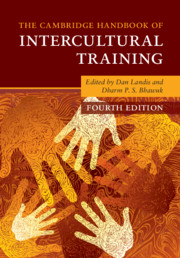Book contents
- The Cambridge Handbook of Intercultural Training
- Reviews
- The Cambridge Handbook of Intercultural Training
- Copyright page
- Dedication
- Frontispiece
- Contents
- Figures
- Tables
- Editors and Contributors
- Foreword
- Preface
- 1 Introduction and Theoretical Framework
- Part I Theoretical Foundations of Intercultural Training
- Part II Practice of Intercultural Training
- Part III Indigenous Psychology and Intercultural Training
- Part IV New Interdisciplinary Approaches to Intercultural Training
- 20 Cultural Neuroscience Basis of Intercultural Training and Education
- 21 Perceptual Representation
- 22 Emotional Contagion, Intimate Intercultural Relationships, and Intercultural Training
- 23 Dialogue and Culture
- 24 Optimizing Globalization through “Intelligent Swarming”
- Part V Summing Up
- Index
- References
21 - Perceptual Representation
An Etic Observational Category for Guiding Intercultural Communication Adaptation
from Part IV - New Interdisciplinary Approaches to Intercultural Training
Published online by Cambridge University Press: 18 September 2020
- The Cambridge Handbook of Intercultural Training
- Reviews
- The Cambridge Handbook of Intercultural Training
- Copyright page
- Dedication
- Frontispiece
- Contents
- Figures
- Tables
- Editors and Contributors
- Foreword
- Preface
- 1 Introduction and Theoretical Framework
- Part I Theoretical Foundations of Intercultural Training
- Part II Practice of Intercultural Training
- Part III Indigenous Psychology and Intercultural Training
- Part IV New Interdisciplinary Approaches to Intercultural Training
- 20 Cultural Neuroscience Basis of Intercultural Training and Education
- 21 Perceptual Representation
- 22 Emotional Contagion, Intimate Intercultural Relationships, and Intercultural Training
- 23 Dialogue and Culture
- 24 Optimizing Globalization through “Intelligent Swarming”
- Part V Summing Up
- Index
- References
Summary
Building on concepts introduced by Edward Stewart in the original 1971 edition of American Cultural Patterns: A Cross-Cultural Perspective and expanded by Milton Bennett and him in its 1991 revision, this chapter presents an observational framework for comparing typical forms of “perceptual representation” among a broad range of regional cultural groupings. The underlying idea is that sensory stimuli can be experienced at various levels of abstraction, and cultural groups that need to coordinate meaning and action will represent experience in ways that systematically differ from some other groups. The labeling of different modes of perceptual representation is presented as an etic observational category, which means that the category is not suitable for describing single cultures or individuals. Etic categories allow observation of the interaction among cultures – both the abstract dynamic of contrasting cultural patterns and the concrete interactional space that is opened when people with different cultural worldviews attempt to communicate. For intercultural professionals, etic categories allow useful comparisons among cultural worldviews for purposes of training and coaching. For participants in cross-cultural encounters, etic categories can form doorways into the experience of alternative worldviews. That empathic experience allows events to be perceived differently and the resulting alternative experience to guide more interculturally adaptive behavior.
Keywords
- Type
- Chapter
- Information
- The Cambridge Handbook of Intercultural Training , pp. 617 - 639Publisher: Cambridge University PressPrint publication year: 2020

